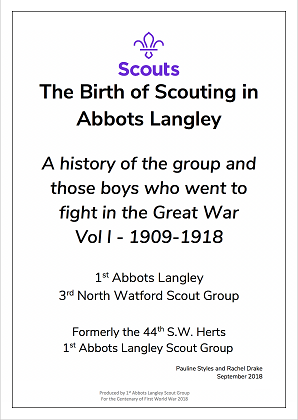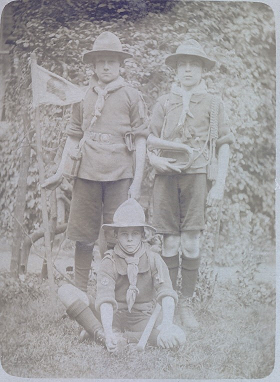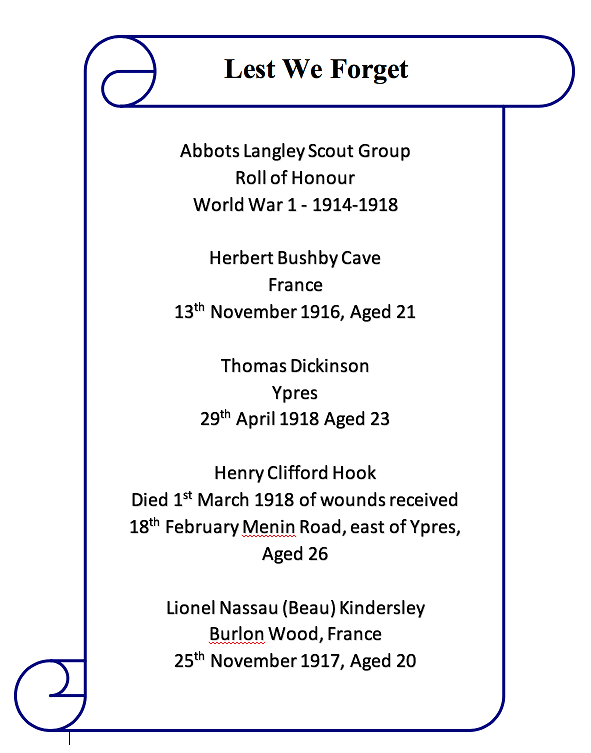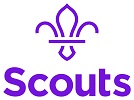 In 2019 we celebrate the Centenary of the Abbots Langley Scout Group
In 2019 we celebrate the Centenary of the Abbots Langley Scout Group
With the introduction of Scouting by Baden-Powell and his publication “Scouting for Boys” many boys across the country started to band together to form their own troops.
We are fortunate enough to have a copy of Harold Robert Overy’s note book, one of the first Abbots Langley Scouts, that he kept during 1909 to 1910 aged 14, and we were able to work through it to find information to identify the boys in the troop at the time, who formed the humble beginnings of our Scout Group, and subsequently enlisted in World War 1.
From a record of registered troops issued by Imperial HQ compiled by County Commissioner Percy Everett for 1909 it lists the troop as having 27 Scouts and 3 Leaders:
Charles Huntingford Bonaker, was the first Scout Master for the Abbots Langley Scout Group and he lived in Lawn House, Hunton Bridge. This is now the Hunter’s Lodge and they have a plaque on the wall commemorating him. The inaugural meeting of the first scout group was on 19th June 1909. Charles was 35, and had been stationed in a nearby region of Africa whilst Baden-Powell was in Mafeking. There is no doubt that he would have been inspired by the vision of Scout Groups forming across the country.
The Assistant Scout Masters who joined at that time were Charles Whittaker, aged 17, who lived in Yew Tree Cottage, Abbots Road (a house that sat between numbers 90 to 96 today) and Frederick Bennett aged 19, who lived at No. 8 Garden Road.
Another influential person at that time was Lieutenant Bramwell Henry Withers, who lived at Mill House, Hunton Bridge. He founded the Kings Langley and Langleybury Scout Troops and had an illustrious military career. He assisted in the First Class examinations at Abbots Langley Scout Group where he marked map reading, signalling and rescue work.
OWL PATROL
15th June 1909
The first boys noted as forming the Owl Troop together are:
B E Hill (Bertram Ernest) Scout No. 2 and Corporal
Son of William Hill the Draper
whose shop was double fronted in the High Street where Alexandra’s and Your Move are today
Living in the Limes, Abbots Road, now the present day Post Office
H R Overy (Harold Robert) Scout No. 1
W R Overy (Wilfred Arthur) Scout No. 3
Son of Robert Overy, Rate and Tax Collector
Living in Linden Villas, Abbots Road, two doors down from Bertram Hill
R Welland (Ralph John Hibbert)
Son of Louise Welland, School Mistress and Robert (deceased)
Living next door the Harold in Linden Villas, Abbots Road
1st July 1909
C E Glenister (Clement Edward) No. 4
Son of E Glenister, the Green Grocers
Living at the Green Grocers in the High Street
22nd July 1909
F C Coleman (Frank Charles)
Living at Homefield, Abbots Road
(redeveloped with houses both sides of exit road from car park
This house would have been opposite the three boys above
12th August 1909
H K M Kindersley (Hugh Kenyon Molesworth)
L N (Beau) Kindersley (Lionel Nassau)
(Sons of Sir Robert Molesworth Kindersley, Governor of the Bank of England)
Living at Langley House

At the meeting on Saturday July 31st 1909 at 5.30pm, it was agreed to buy 5 hats, 5 haversacks and 5 jerseys, and the boys concerned were measured up. Scout Nos. 3 and 6 went to Watford in the evening and purchased the articles and another meeting was held at 8.30 pm when the two Scouts returned where they had a parade in uniform for the first time.
By 1910 they had all subscribed money to buy a Bugle which was obtained for 4 shillings and 5 pence and Patrol Leader R. Welland was voted to be the Bugler.
That same year saw the first census of over a hundred thousand Scouts in the UK and in less than three years, Scouting had reached a firm footing, in which the Abbots Langley group were a part.
- New scouts were enrolled as a Tenderfoot and to gain seniority they had a series of tests to undertake to reach First Class, Second Class, King's Scout and Silver Wolf. Most of the time when the Patrol met they would have been practising for these tests which encompassed:
- We have identified 40 Scouts and Scout Leaders who were in the original 1909 Troop all of whom went to war
- Many of these Scouts would have joined the Yeomanry as territorials when they were old enough as they would have seen them marching locally.
- Once war was declared several of them joined as soon as they could and many of them joined together in the same regiment as noted by their regimental number.
- There were several regiments of soldiers billeted in Abbots Langley for training and exercise. Some of the men of the 13th (County of London) Battalion (Princess Louise’s Kensington Battalion) arrived on August 17th 1914, having marched from London and were visited by Princess Louise when on parade at Cecil Lodge. Many of them were camped on farmland off Toms Lane. Ralph Welland, Wilfred Overy and Bertram Hill enlisted with them in early September 1914.
- 4 of the 40 were Killed in Action, or died from their battle wounds. We are proud to have been able to add these names to the Scout Association’s Roll of Honour for WW1.
- 9 were wounded/invalided out
- Wilfred Overy was a Prisoner of War – but in true Scouting spirit managed to write an article on “the only Englishman who ever became Pope” which was printed in the British Prisoners of War publication The Rennbahn
| Flag Flying / Knots | Cook eggs 3 ways, porridge, bacon, hunter's stew: or skin and cook a rabbit / pluck and cook a bird. Make a 'damper' of half a pound of flour, or a twist' baked on a thick stick | Lay and light a fire with no more than 2 matches |
| Reporting incidents / observation | Walk a mile in 12 minutes | Swim 50 yards |
| Map work / Tracking / Judging Distance | Carpentry | Have 6d – 1/- in the bank |
| Signalling, semaphore / morse code at 16 letters per minute | Rescue work / bandaging / first aid | Be able to describe how to stop a runaway horse! |
| Shooting | Drill a squad in elementary infantry movements, picking out any faults in the drill positions |
It is a true testament to Scouting
that it gave them the grounding
on which to survive the harshness of war,
that it gave them the grounding
and amazing that so many of them survived

Scouts and Leaders (L) who survived
| Arthur Ernest Aldridge | Fred Carter | Percy Frederick George Mitchell |
| Herbert Joseph Aldridge | Arthur William Chalk | Leonard Wilfred Munt |
| Frank George Allaway/Alloway | Frank Charles Coleman | Harold Robert Overy |
| Richard Charles Atkins | Richard Douglas Coombes | Wilfred Arthur Overy |
| Henry Edward Austin | Arthur Albert Diaper | Lewis Stanley Quarman |
| James George Matthew Barnes | Arthur Downer | Charles Thomas Ridgeway |
| Charles Julien Batten | Clement Edward Glenister | Percy Charles Robins |
| Ernest James Bennett | Harry Charles Flowers | Frederick Herbert Scott |
| Frederick Arthur Bennett (L) | Edwin Edward Hart | Thomas Alfred Shepherd |
| Charles Huntingford Bonaker (L) | Percy George Hedges | Ralph John Hibbert Welland |
| Clifford Harold Bourne | Bertrand Ernest Hill | Charles Whittaker (L) |
| Arthur Briers | Hugh Kenyon Molesworth Kindersley | Bramwell Henry Withers (L) |
| Leonard Raynor Busby |
We have no records between 1910 and 1927 to help us find out much more. We only assume that the Abbots Langley Scout Group continued until the outbreak of The War in 1914, at which time most enlisted and the Group would have disbanded, and was not re-established again until 1927 when Alan MacDonald started it up again.
Just before the end of the War in 1917 Baden-Powell set up a scheme for Senior Scouts, which changed its name to Rover Scouts the next year, for anyone over the age of 18, with Outdoor Adventure and Service as the main part of its programme. We have not been able to establish if some of these men came back into Scouting as Leaders/supporters after the war.
Our first record of a Rover Scout unit in the Abbots Langley Scout Group was 1940, although they had an active Executive Committee and Leaders from 1927 onwards.
What we do know us that Harold Overy presented the Rover Crew in July 1962, with the gift of books, maps and his set of pre-1914 Patrol Leaders Badges, but at the time of writing, we cannot locate their whereabouts.













